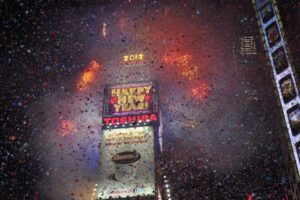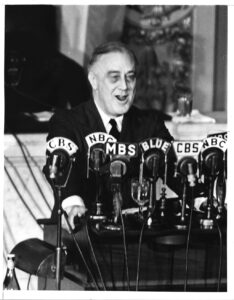We are living in uncertain times. Americans are ringing in a new year that is essentially
guaranteed to be hectic politically, with a high-stakes presidential election and adjacent legal battles that will play a major role in its ultimate trajectory.
As we welcome 2024, the worldwide Jewish community is still reeling from the October 7 terrorist attack in Israel, while over 100 hostages remain held in Gaza. This was after several months of fierce tensions over judicial reform which had divided Israelis — something that feels like a distant memory now. On top of all of this are the continuing conflicts both in Israel and Ukraine, with fear of broader geographical expansion.
With all this uncertainty going into the new year, let us reflect on another period of time which was even more tumultuous than today — World War II — and see how Americans during that difficult era balanced the previous year’s concerning and saddening news with their desire to celebrate and appreciate the year to come.
“NEW YEAR REVELRY DOWNS WAR GLOOM,” read the headline of the The New York Times on January 1, 1941, describing the celebration in Times Square. The prior year was very challenging globally, with Hitler’s Germany making worrying advances in Europe.
The Times described it as “one of the largest and most pleasure-bent crowds that ever greeted a new year,” even though “there was the note of solemnity, too.” In other countries, “there were more dark days ahead for countless human beings.”

Columnist Al Segal was even more doomy in his assessment of current events, stating in The Jewish Post that he prefers “to look backward rather than forward.” To look back at a time when, even if there were episodes here or there, “the general human destiny looked safe and bright ahead the whole year through.” Now, in 1941, Segal wishes everybody “a happy remembering.”
President Roosevelt, in his State of the Union address, said that “at no previous time has American security been as seriously threatened from without as it is today,” given the serious stake the United States had in world events during these troubling times. “I find it, unhappily, necessary to report that the future and the safety of our country and of our democracy are overwhelmingly involved in events far beyond our borders.”
Roosevelt would be proven right, and the December 7 attack on Pearl Harbor will be fresh on Americans’ minds by the time they ring in the next New Year, 1942. One would think that this New Year’s would be more somber than the previous, as the war had now been brought to American soil.
Yet, the effect was quite the opposite. “If Axis ears did not hear last night’s revelry in Times Square it was not that New Yorkers didn’t try,” the Times stated, noting that there was even more spirit than in times of peace. Such display of resilience is remarkable during what was a dark time in American and world history.
But that resilience would be tested, as 1943 was not greeted with the same energy. “New Year’s Eve in Times Square had a weird quality last night,” the Times reported. “There was a note of sluggishness…war somehow laid its hand on the celebration and tended to mute it.”
Interestingly, 1942 was a better year in terms of the war effort than 1941, which would explain why the crowd was still “in extremely high spirits.” Furthermore, 1943 was anticipated to be a more hopeful year. But the mixed mood that night seems to have reflected weariness from the war, and perhaps the horrors across Europe were haunting Americans as well, given the newly emerging reports of mass extermination against Jews.

Roosevelt, in his 1943 State of the Union address, warned that “the coming year will be filled with violent conflicts — yet with high promise of better things.” That is because “the Axis powers knew that they must win the war in 1942 — or eventually lose everything. I do not need to tell you that our enemies did not win the war in 1942.”
“CROWDS GREET THE NEW YEAR HERE IN VICTORY SPIRIT,” read the next year’s headline of The New York Times on New Year’s Day, 1944. The celebrators in Times Square were much happier than the year before. “The whole picture seemed to have changed since then,” the Times observed, “from dark foreboding to the certainty of victory.”
1945 was even more hopeful, though with greater contrast in Times Square compared to the year before. The Times reported a “reasonably subdued crowd of merrymakers.” But there were “thoughts of victory and enduring peace” in light of positive developments in the war effort.
“This new year of 1945 can be the greatest year of achievement in human history,” Roosevelt predicted during the State of the Union. “1945 can see the final ending of the Nazi-Fascist reign of terror in Europe. 1945 can see the closing in of the forces of retribution about the center of the malignant power of imperialistic Japan. Most important of all — 1945 can and must see the substantial beginning of the organization of world peace.”
Though Roosevelt did not live to see it through, passing away in April of that year, his successor President Truman made sure to point out how right he was. “All those hopes, and more, were fulfilled in the year 1945,” Truman would say the following year, in his first State of the Union address. Meanwhile, with the arrival of 1946 the Times noted how “reports from all over the nation showed that, for noise and general joy, it was the merriest New Year’s Eve since the nation was plunged into war.”
While clearly not comparable to the situation in the 1940s, for 2024 let us draw inspiration from the resilience of past generations, and pray for a swift end to the devastating conflicts and the dangerous divisions that confront us in these uncertain times. With hope for a year of resolution and peace, have a Happy New Year!